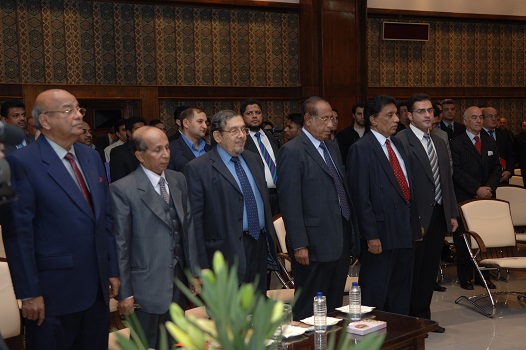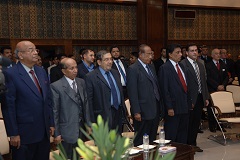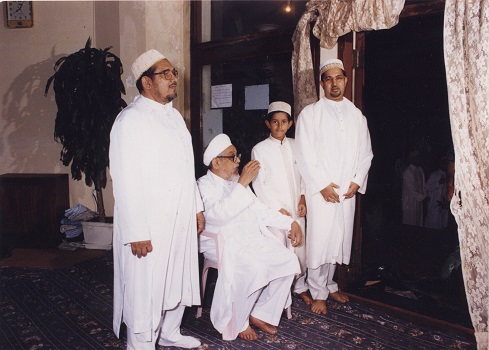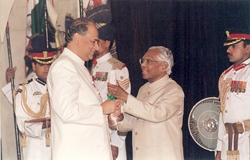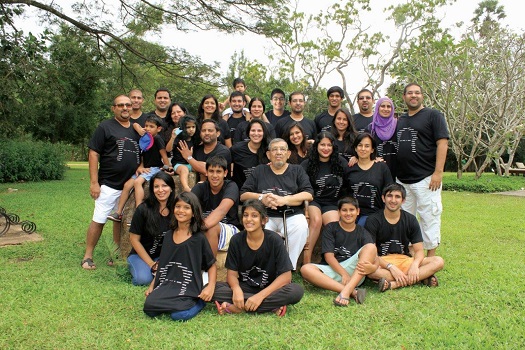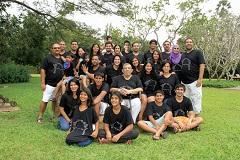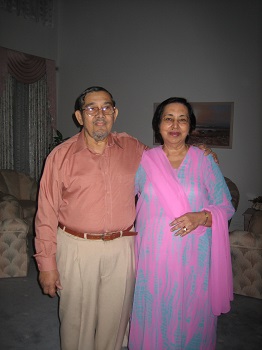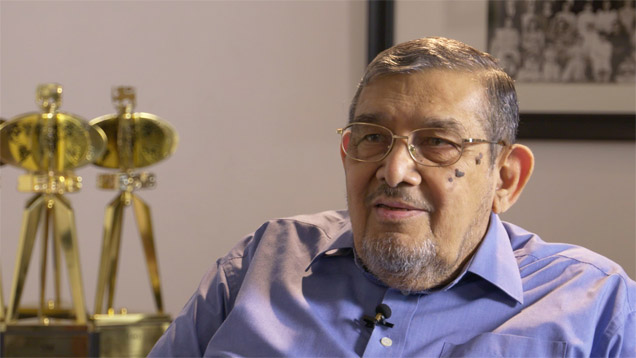
Sri Lanka
Abbas Akbarally
- Chairman, Akbar Brothers (Tea; Diversified)
Born Colombo, Sri Lanka, 1933; died, Colombo, Sri Lanka, 2020. St. Peters College, Sri Lanka.
“The main thing is integrity, honesty; and once the banks know
that you are not going to take their money and go to the casino, they will give you the money.”
Summary
Abbas Akbarally is Chairman of Akbar Brothers, the world’s largest tea company. Based in Sri Lanka, the company also has diversified operations in cement, and wind and hydro power. The interview describes how Akbarally’s career began in 1951 working in the tea department of Hebtulabhoy & Company, a family company founded by his grandfather. In 1969, Abbas and his brothers broke off to focus on tea manufacturing, forming Akbar Brothers. Working first as a tea exporting business, Akbar Brothers purchased tea from domestic sources and exported it internationally under various brands.
Akbarally notes that one challenge to Akbar Brothers was the nationalization of Sri Lankan tea plantations in 1971-72. Due to political regime change and balance of payments problems, Sri Lanka began replacing its foreign imports with domestic production to lessen Sri Lanka’s dependency on imports from the 1960s. The tightly regulated economy marginalized the private sector, driving many of Sri Lanka’s tea farmers to Africa. Akbar Brothers was forced to purchase tea from inexperienced people running the nationalized tea plantations. In 1977 Sri Lanka began liberalizing the economy once more, but it was not until 1992 when tea industry was privatized, with Indian corporations, including Tata, buying many Sri Lankan tea plantations. Tata Tea became the second largest tea manufacturer in Sri Lanka, behind Akbar Brothers. In the interview, Akbarally maintains that Sri Lanka is still suffering repercussions from the nationalization of the tea industry, including the loss of talent, as well as challenges from rising labor costs and climate change.
Akbarally considers it remarkable that Akbar Brothers managed to survive despite shifting policies and volatile political conditions in Middle Eastern countries that imported their tea. Akbarally attributes this survival in part to an increasingly diverse business portfolio. The interview sheds light on the drivers of this diversification. Using foreign exchange from the tea export business, Akbar Brothers was able to import items like tires and cement, despite strict foreign exchange controls. As younger family members joined the company, Akbar Brothers further expanded to businesses like wind and hydro power, aquatic farming, and emissions testing. Government incentives for green industries also encouraged the diversification into renewables. Throughout the interview Akbarally stresses the importance of integrity in business, which he argues encouraged trust in his business and facilitated capital-raising.
Read more
Abbas Akbarally is Chairman of Akbar Brothers, the world’s largest tea company. Based in Sri Lanka, the company also has diversified operations in cement, and wind and hydro power. The interview describes how Akbarally’s career began in 1951 working in the tea department of Hebtulabhoy & Company, a family company founded by his grandfather. In 1969, Abbas and his brothers broke off to focus on tea manufacturing, forming Akbar Brothers. Working first as a tea exporting business, Akbar Brothers purchased tea from domestic sources and exported it internationally under various brands.
Akbarally notes that one challenge to Akbar Brothers was the nationalization of Sri Lankan tea plantations in 1971-72. Due to political regime change and balance of payments problems, Sri Lanka began replacing its foreign imports with domestic production to lessen Sri Lanka’s dependency on imports from the 1960s. The tightly regulated economy marginalized the private sector, driving many of Sri Lanka’s tea farmers to Africa. Akbar Brothers was forced to purchase tea from inexperienced people running the nationalized tea plantations. In 1977 Sri Lanka began liberalizing the economy once more, but it was not until 1992 when tea industry was privatized, with Indian corporations, including Tata, buying many Sri Lankan tea plantations. Tata Tea became the second largest tea manufacturer in Sri Lanka, behind Akbar Brothers. In the interview, Akbarally maintains that Sri Lanka is still suffering repercussions from the nationalization of the tea industry, including the loss of talent, as well as challenges from rising labor costs and climate change.
Akbarally considers it remarkable that Akbar Brothers managed to survive despite shifting policies and volatile political conditions in Middle Eastern countries that imported their tea. Akbarally attributes this survival in part to an increasingly diverse business portfolio. The interview sheds light on the drivers of this diversification. Using foreign exchange from the tea export business, Akbar Brothers was able to import items like tires and cement, despite strict foreign exchange controls. As younger family members joined the company, Akbar Brothers further expanded to businesses like wind and hydro power, aquatic farming, and emissions testing. Government incentives for green industries also encouraged the diversification into renewables. Throughout the interview Akbarally stresses the importance of integrity in business, which he argues encouraged trust in his business and facilitated capital-raising.
Close
Video Clips by Topic
Abbas Akbarally, the Chair of Akbar Brothers which is Sri Lanka’s and the world’s largest tea company, discusses why and how his firm began diversifying it’s portfolio by importing and selling cement.
Abbas Akbarally, Chair of Akbar Brothers which is Sri Lanka’s and the world’s largest tea company, discusses the consequences of the Sri Lankan government’s nationalization of tea plantations in the 1970s.
Full Length Video (login required)
Additional Resources
- Kannan Arunasalam, “From Merchant Prince to Akbar Brothers: Inayat Akbarally and the Bohras of Sri Lanka,” Groundviews, 2013.
- Anoma Ariyawardana, "Sources of Competitive Advantage and Firm Performance: The Case of Sri Lankan Value-Added Tea Producers"Asia Pacific Journal of Management, March 2003, Volume 20, Issue 1, pp 73-90.
Industry Capability Report: Tea Sector, Sri Lanka Export Development Board, June 2014.
- Ridwan Ali, Yusuf A. Choudhry and Douglas W. Lister, World Bank Discussion Paper No 368: Sri Lanka’s Tea Industry, Succeeding in the Global Market, 1997.
- Prema-Chandra Athukorala and Sarah Rajapatirana, "Liberalization and Industrial Transformation: Lessons from the Sri Lankan Experience," Economic Development and Cultural Change, April 2000, Volume 48, No. 3, pp 543-572.
Interview Citation Format
Interview with Abbas Akbarally, interviewed by V. G. Narayanan, December 23, 2015, Creating Emerging Markets Project, Baker Library Historical Collections, Harvard Business School, http://www.hbs.edu/creating-emerging-markets/.


